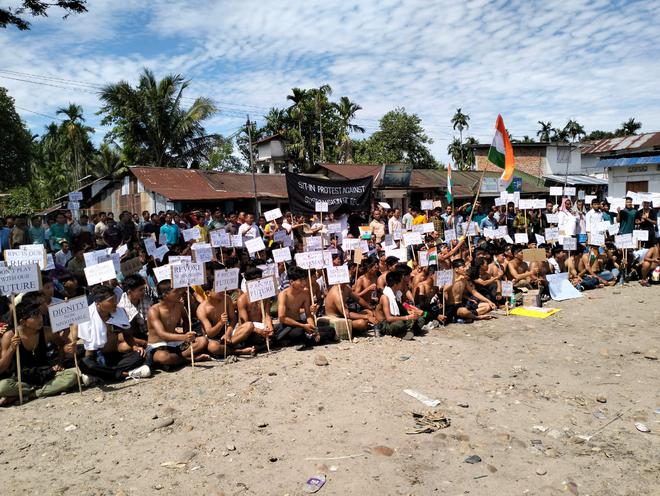The Chakmas and Hajongs rehabilitated in Arunachal Pradesh in the 1960s on Saturday protested the denial of residential proof certificates (RPCs) to them, allegedly carried out as part of the State policy to throw them out of Arunachal Pradesh.
Hundreds of refugees organised a peaceful demonstration at Diyun, their largest settlement in the State’s Changlang district, on Friday to demand the resumption of the process to issue RPCs. The sit-in coincided with the visit of a five-member enquiry team to Diyun.
The Pema Khandu government had on July 30 constituted the committee comprising three bureaucrats and two representatives of the All Arunachal Pradesh Students’ Union (AAPSU) for probing the issuance of the RPCs to at least 500 Chakmas and Hajongs by the local administration.
Under pressure from the AAPSU, which had threatened a State-wide shutdown, the State government had on July 29 suspended the RPCs issued and stopped the issuance of fresh certificates.
"The denial of the RPCs is nothing but the continuation of the racial profiling of the Chakmas and Hajongs. We will not accept kangaroo justice where the AAPSU has become the complainant, investigator, prosecutor and judge – all rolled into one. This is not something allowed in a country governed by the rule of law,” Krishna Chakma, spokesperson of the Chakma Hajong Rights Alliance said.
“The first victim of the denial of the RPCs are job-seekers who are students. They are citizens of India and often go for recruitment in the Army. They are being denied the opportunity through the suspension of RPCs when a recruitment drive has started,” Rup Singh Chakma, the president of the Arunachal Pradesh Chakma Students’ Union (APCSU) said.
Various documents
“We are merely seeking RPCs as proof that we live in Arunachal Pradesh. This is not PRC,” he added.

PRC expands to permanent residence certificate, issued only to the State’s Scheduled Tribes. Residents of other States or Union Territories working in Arunachal Pradesh are issued temporary residence certificates (TRCs) renewable after three years. Anyone without RPC, PRC or TRC needs to have an inner-line permit to enter the State.
The APCSU sought to draw the attention of rights bodies to the “attempt to deny the existence” of the Buddhist Chakmas and the Hindu Hajongs in Arunachal Pradesh.
Also read: Make citizenship to Chakma, Hajongs in Arunachal final: NHRC
According to Santosh Chakma, the president of the Committee for Citizens’ Rights of the Chakmas and Hajongs of Arunachal Pradesh, the entire process to victimise the refugees started with illegality.
“On July 18, an AAPSU delegation entered the office of Diyun’s extra assistant commissioner and took away the papers relating to the RPCs. Instead of enforcing the rule of law, the State awarded the AAPSU by including its members in the inquiry team,” he said.
Displaced by Kaptai Dam
The 2011 census counted 47,471 Chakmas and Hajongs in Arunachal Pradesh. Organisations representing the refugees estimate their current population at 65,000. Most are descendants of 14,888 Chakmas and Hajongs who fled from East Pakistan and were settled by New Delhi in the erstwhile North East Frontier Agency (NEFA) in 1964.
East Pakistan became Bangladesh in 1971 and NEFA became Arunachal Pradesh, first as Union Territory in 1972 and then as a State in 1987.
A majority of the Chakmas and Hajongs were displaced by the Kaptai Dam in the Chittagong Hill Tracts of present-day Bangladesh. Some fled religious persecution in those hills between 1964 and 1966.
About 90% of the refugees got citizenship by birth under Section 3 of the Citizenship Act of 1955, but the applications of 4,627 of them for citizenship have been pending for years despite a Supreme Court order in January 1996 for processing their applications.
In 2021, Chief Minister Khandu announced that the refugees would be settled outside the State. “The denial of the RPCs is a part of this campaign,” the APCSU said.







